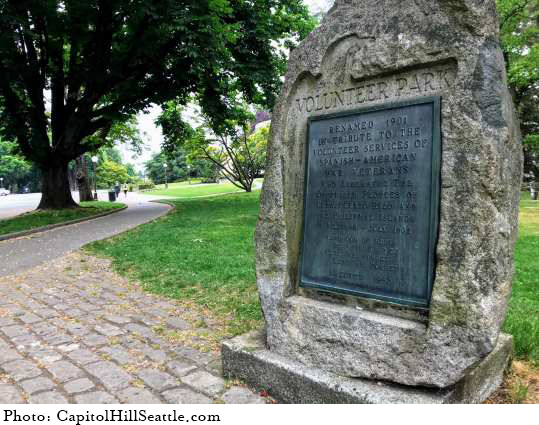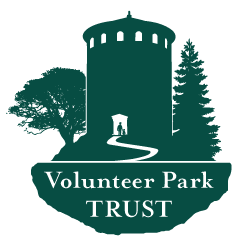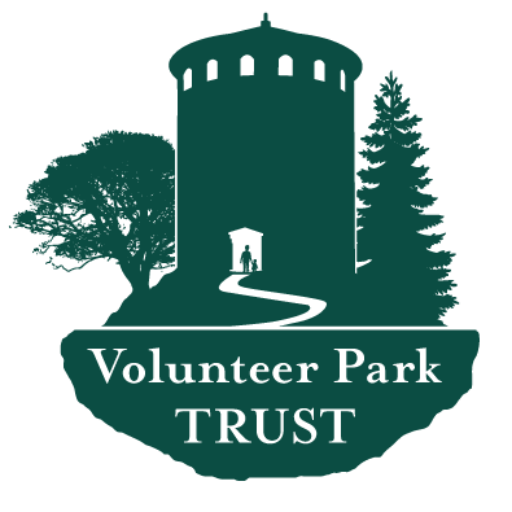
- This event has passed.
Talk: Volunteering for Empire
May 7, 2022 @ 3:00 pm - 4:30 pm PDT

Volunteer Park Trust and UW’s Southeast Asia Center and Center for Global Studies present Volunteering for Empire: The Wars of 1898 and Seattle’s Volunteer Park, a presentation and discussion centered on memorial plaque located near the water tower in the park that was recently removed due to concerns about its accuracy. The program be held at the Seattle Asian Art Museum in the Stimson Auditorium and will be livestreamed for remote viewing via Volunteer Park Trust’s Facebook page on Saturday, May 7 at 3:00 pm. It will feature a presentation by Abe Ignacio, co-author of “The Forbidden Book,” a history of the war told through contemporary political cartoons. University of Washington Department of History professors Vicente Rafael and Ileana Rodriguez-Silva will discuss the wars and their connection to Volunteer Park in a panel moderated by Professor Christoph Giebel of the Jackson School of International Studies. Admission is free and tickets can be obtained at Eventbrite.
Volunteer Park was originally “City Park,” and was renamed in 1901 to honor the veterans of the War of 1898 (also known as the Spanish-American War). The commemorative plaque installed in 1953 described that war as a war of liberation for the peoples of the Philippines, Cuba, and Puerto Rico. But history no longer sees, and many people at the time did not see, this war as one of liberation, but rather one of imperial conquest. An effort to remove the plaque began with community member Shamika Rivera’s request to Seattle Parks and was bolstered by an op-ed, “The Big Lie in Volunteer Park,” University of Washington professor Christoph Giebel, published in Northwest Asian Weekly in May 2021. Seattle Parks and Recreation removed the plaque the following summer, and Superintendent Jesús Aguirre noted that, “Seattle Parks and Recreation seeks to steward our historic parks in a way that fits with our community values [and] . . . ensure that what is celebrated and remembered in our parks affirms our commitments to advancing racial equity and inclusivity in our public spaces.”
The program will discuss why the memorial plaque was problematic in the context of the history of the war and its aftermath. It will also examine larger questions, such as how racism has influenced and shaped American foreign policy, and how we grapple with the consequences and outcomes of American wars.
Abe Ignacio’s The Forbidden Book uses over 200 political cartoons from 1898 to 1906 to chronicle the war between the United States and the Philippines, which lasted more than 15 years and killed hundreds of thousands of Filipinos. Mr. Ignacio’s presentation will explain how the American public viewed the war while it was being fought.
The panelists and moderator for the discussion are history professors at the University of Washington. Dr. Vicente Rafael is an historian of Southeast Asian history and American colonialism. Dr. Ileana Rodriguez-Silva is a professor of Latin American and Caribbean history, examining the intersections of race, colonialism, and national identity. Moderator Dr. Christoph Giebel is a professor of International Studies and History, who studies colonialism and imperialism in Asia.
Tickets can be reserved at Eventbrite. Tickets include free admission to The Seattle Asian Art Museum. A bibliography of reference materials for use before the talk is available here.
This event is co-hosted by the Capitol Hill Historical Society, El Centro de la Raza, Filipino American National Historical Society, Friends of the Conservatory, and the Wing Luke Museum.
The Seattle Asian Art Museum in Volunteer Park can be reached by light rail (Capitol Hill Station) and Metro bus routes #10 and #49. Parking is available in Volunteer Park, but there are construction detours currently in place.
The UW Southeast Asia Center (SEAC) is a national resource center for the study of Southeast Asia, with a mission to create and spread knowledge about Southeast Asia. SEAC fulfills this mission through course offerings, student fellowships, support for faculty professional development, and public programming. The Southeast Asia Studies program at UW offers undergraduate and graduate degrees, and courses in six Southeast Asian languages.

